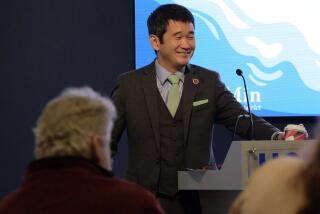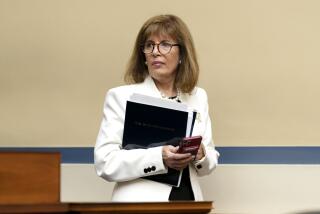Rep. Patsy Mink, 74; Legislator From Hawaii
WASHINGTON — U.S. Rep. Patsy Mink (D-Hawaii), an ardent liberal and feminist who served 24 years in Congress, died Saturday. She was 74 and had been battling viral pneumonia for several weeks.
Mink died at Straub Clinic and Hospital in Honolulu, her Washington office said. She had been treated there since Aug. 30 for the pneumonia, which stemmed from chickenpox.
Mink was elected to Congress in 1964 and left office in 1977 to run for the Senate, a race she lost. She was reelected to the House in 1990 and had won her last two elections by wide margins. She represented most of Hawaii outside of Honolulu.
Despite being hospitalized at the time, Mink easily won a primary election this month and was favored to win reelection in November.
Sen. Daniel K. Akaka (D-Hawaii), a longtime colleague, praised her Saturday as a “petite woman with a powerful voice and a peerless reputation as a champion for equal opportunity, civil rights and education.”
Mink’s “vision of hope and passion for justice” had helped bring about statehood for Hawaii and had created new opportunities for the state’s residents, he said.
Born in Hawaii, Mink became a lawyer and then a member of the House and Senate in Hawaii, while it was still a territory. In Congress, she was an early opponent of the Vietnam War and consistently supported abortion rights and opposed the death penalty.
Mink was an author of Title IX of the Education Act of 1972, which gave a major boost to women’s athletics. The law says both genders must be treated equally in any education program or activity that receives federal aid.
More recently, she opposed the toughening of welfare laws signed by President Clinton, but was also a sharp critic of her Republican colleagues during Clinton’s 1998 impeachment.
In a 1999 book, she suggested that sex discrimination had resulted in her pursuit of a political career.
Mink said she applied to about a dozen medical schools during her senior year of college and had good test scores, but was not admitted anywhere. She went to law school instead, but was rejected by law firms, she said, because she was married and had a young child. She eventually opened her own practice.
Transportation Secretary Norman Y. Mineta said Saturday that Mink had been an “inspiring voice for the people of her state, and for the forgotten, the disenfranchised, the poor.”
“She was the first Asian Pacific American woman admitted the bar of Hawaii. She was the first Asian Pacific American woman elected to state office in Hawaii, and the first woman of color elected to national office in the United States when she joined the Congress in 1964,” Mineta said. “She not only opened those doors, she actively helped others pass through them.”
Between her two stretches of House service, Mink ran unsuccessfully for governor of Hawaii and mayor of Honolulu. She served under President Carter as assistant secretary of state for oceans, international environment and scientific affairs.
She was president of the liberal group Americans for Democratic Action from 1978 to 1981.
Mink was to face Republican state Rep. Bob McDermott in the November election for the House. According to a report in the Honolulu Star-Bulletin, the deadline for removal of Mink’s name from the ballot has expired.
State law allows a deceased candidate’s name to appear on a ballot and includes provisions for a special election to fill the seat, the newspaper said. House seats can be filled only by election, not by gubernatorial appointment, the paper said.
Mink is survived by her husband, John Mink, and daughter, Wendy.
More to Read
Get the L.A. Times Politics newsletter
Deeply reported insights into legislation, politics and policy from Sacramento, Washington and beyond. In your inbox three times per week.
You may occasionally receive promotional content from the Los Angeles Times.










